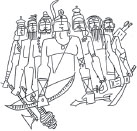

The Pandavas and the Kauravas were about to go to war. Both approached Krishna to help. ‘Me unarmed, or my fully equipped army? Narayana or Narayani Sena?’ asked Krishna. ‘You,’ said Arjuna, the Pandava, much to the relief of Duryodhana, the Kaurava, who was happy to get the army. What do we seek when we hire people to work for us: Narayana or Narayani Sena? Do we see who they are or do we focus only on qualifications and experience they possess? Are we the Pandavas or the Kauravas?
We would like to associate ourselves with the ‘good’ Pandavas and not the ‘bad’ Kauravas but everyone knows that management is about measurement. We cannot measure Narayana, what a person is. We can only measure Narayani, what a person has, his experience and qualifications. We hope to figure out the Narayana side during the interview process. But that remains highly subjective.
We may hear stories of great entrepreneurs who dropped out of school, who did not complete their degrees, but when it comes to recruitment, we know we want our people to be from IIT or IIM. There are at least two major FMCG firms that are very clear that marketing people have to be hired from Grade 1 B-schools and sales people may be from Grade 2 B-schools. Many consulting firms will select consultants from a set of engineering colleges and analysts from another set of engineering colleges, the assumption being that the filter used by the colleges for admission matches the filter they use for recruitment.
The primary reason for this is that the measurable Narayani is objective and justify itself in audit examination. Large-scale organizations are suspicious of subjectivity, howsoever brilliant it may be. And so Narayana is always nudged out, with greater reliance on tests and measurements. The HR team focuses on the Narayani side; the boss, who can take accountability, focuses on the Narayana side.
But recruitment needs vary for small start-ups and large steady-state organizations. The start-up needs more Narayana than Narayani as the job is unpredictable and you need people who are adaptable and highly flexible. Qualification and experience are poor indicators of the same. The steady-state organization is in a more predictable phase and so needs people who will fit into the system that is rather rigid. Here Narayani is a good enough marker.
Why would someone in a comfortable steady-state organization want to enter an unpredictable, volatile environment of a start-up? Money? Passion? If a person joins a start-up for the money, embracing the risks, he also needs to submit to the disorder that is an inevitable part of something that is being established. He also needs to have great interpersonal skills, be a leader in some situations and a follower in others, display passion, even if he may not share the entrepreneur’s passion. If a person joins for passion, he also needs interpersonal skills, and the ability to either handle lack of structure, or create structure for the benefit of others. Do interviews reveal if a person has great interpersonal skills? Are we not trained to pretend by the corporate world—use the right jargon like ‘team work’ and ‘collaboration’, say what the interviewer wants to hear?
When Arjuna got Krishna, did he know what he was getting? Or was he just smitten by his friend and cousin? Did he know he would have a nervous breakdown on the brink of the war? Did he know that Krishna would sing the Bhagavad Gita? We don’t know what challenges face us in the future and we only hope that those whom we recruit will have the potential to help us during unplanned, unpredicted crises. The fully equipped army of Krishna would have been of no help had Duryodhana had a nervous breakdown.
